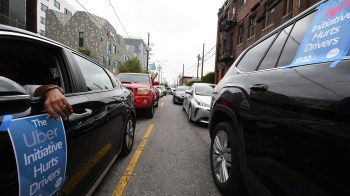The economic challenges that Egypt still faces
Jeff Horwich: Just one week ago Mohamed Morsi moved into the Egyptian presidential palace. Egypt has the region’s third-largest economy, but income per-person is near the bottom.
Isobel Coleman is a senior fellow at the Council on Foreign Relations — she’s here to help us go in-depth on Morsi and the task ahead of him. Welcome to Marketplace.
Isobel Coleman: Thanks for having me.
Horwich: Give me a portrait of Egypt’s economy, right at this moment; is it a total wreck after all this?
Coleman: It actually fared reasonably well in the past year, given everything that’s been going on. But it has resorted to some very short-term measures to prop up the economy and its really running up against the wall very very quickly.
Horwich: Give me a couple of examples of the short-term measures that the military government, I guess, has taken in the interim.
Coleman: Well, Egypt is facing a liquidity crisis. It’s running a budget deficit and has been borrowing from local banks to fund that deficit but has also been drawing down its foreign exchange reserves. Its very dependent on foreign exchange reserves for two critical imports: it imports 40 percent of its energy and 60 percent of its food. And you know, look, energy and food are the most critical things for people’s daily lives.
Horwich: So what does the West want to see, in term of economic policies?
Coleman: The West has offered to lend money to Egypt and to the other so-called “Arab Spring” countries but they want to see economic reforms. Egypt has not taken any of those economic reforms steps so far, so that money has not really been available to Egypt. You also have the IMF that has been negotiating a $3.2 billion loan to Egypt; the Muslim Brotherhood has been against the IMF because it felt that it was not the place of an interim government to negotiate that loan. Now that President Morsi of the Muslim Brotherhood is in place in Egypt, closing that deal with the IMF will be critically important.
Horwich: Are the Egyptian people likely to have a lot of patience while the Muslim Brotherhood figures this all out?
Coleman: People talk about the economy all the time; they’re very nervous about their livelihoods, their jobs. So, I think if Egyptians understand that its leaders are making progress on the measures we’ve discussed that would unlock other sources of foreign funding. Egypt needs probably around $25 billion of foreign funding this year to deal with all of its liquidity issues — and if the leaders of the country can articulate why they’re doing what they’re doing, what the shared sacrifices need to be, my guess is people are going to give them a little more time.
Horwich: Isobel Coleman is a senior fellow at the Council on Foreign Relations. Thank you.
Coleman: Thank you.
There’s a lot happening in the world. Through it all, Marketplace is here for you.
You rely on Marketplace to break down the world’s events and tell you how it affects you in a fact-based, approachable way. We rely on your financial support to keep making that possible.
Your donation today powers the independent journalism that you rely on. For just $5/month, you can help sustain Marketplace so we can keep reporting on the things that matter to you.


















